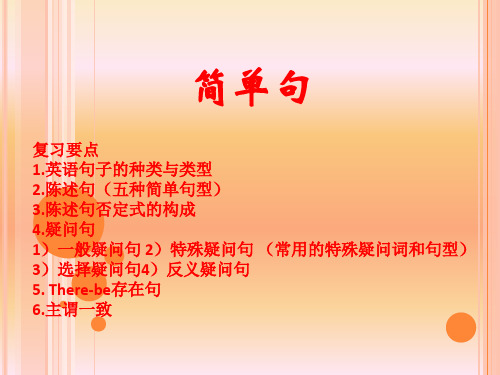中考英语语法 15.简单句(基础讲解)
- 格式:doc
- 大小:43.50 KB
- 文档页数:5



中考英语语法知识讲解一、词性【实词】名词、代词、动词、形容词、副词、数词实词是指实在意义,能独立承担句子成分的词,实词有词形的变化。
【虚词】冠词、介词、连词、感叹词与实词相对,虚词没有实在意义,不能独立承担句子成分,虚词没有词形的变化。
1、名词(n.)表示人、事物、地点或抽象概念的名称。
[例]boy, morning, orange, clock, etc.2、代词(pron.)主要用来代替名词。
[例]who, she, you, it, etc.3、形容词(adj.)表示人或事物的性质或特征。
[例]good, white, orange, ugly, etc.4、数词(num.)表示数量或事物的顺序。
[例]one, two, three, hundred, etc.5、动词(v.)表示动作或状态。
[例]am, is, think, does, may, etc.6、副词(adv.)修饰动词、形容词、副词,说明时间、地点、程度等。
[例]now, often, slowly, home, hard, very, really, etc.7、冠词(art.)用在名词前,帮助说明名词。
[例]a, an, the.8、介词(prep.)表示它后面的名词或代词与其他句子成分的关系。
[例]in, on, at, from, above, under, behind, with, without, to, etc.9、连词(conj.)用来连接词、短语或句子。
[例]and, or, before, when, while, after, as soon as, if, unless, until, because, so, though, but, even if, even though, as if, etc.10、感叹词(interj.)表喜、怒、哀、乐等感情。
[例]oh, well, hi, hello, etc.二、句子成分1、主语句子所要说的人或事物,回答是“谁”或者“什么”。


初中英语语法基础句子结构与类型专题讲解一.句子的种类(一)根据结构划分:①简单句:(5种基本句型)S+Vi(主+谓)S+V系动词+ P (主+系+表)S+Vt+O(主+谓+宾)S+Vt+IO+DO(主+谓+间宾+直宾)S+Vt+O+OC(主+谓+宾+宾补)②并列句and, but, or, soThis is me and these are my friends.They must stay in water, or they will die.It’s not cheap, but it is very good.It was late, so I went to bed.③复合句:包含一个主句和一个或几个从句的句子叫复合句,从句由引导词或连词引导。
名词性从句(宾语,主语,表语,同位语)从句形容词性从句(定语从句)副词性从句(状语从句)(二)根据功能划分:陈述句, 祈使句, 感叹句,疑问句(一般疑问句,特殊疑问句,选择疑问句,反意疑问句等)1)陈述句:说明一个事实或陈述一种看法。
例如:Light travels faster than sound.光比声传播速度快。
(说明事实)The film is rather boring.这部电影很乏味。
(说明看法)2)疑问句:提出问题。
有以下四种:a. 一般疑问句:Can you finish the work in time?b. 特殊疑问句:Where do you live?c. 选择疑问句:Do you want tea or coffee?d. 反意疑问句:He doesn't know her, does he?3)祈使句:提出请求,建议或发出命令。
Don't be nervous!Let’s go fishing tomorrow.4)感叹句:表示说话人惊奇、喜悦、愤怒等情绪。
What good news it is ! How beautiful the girl is !二.简单句的基本句型介绍:1. 基本句型一:S+Vi (主+不及物动词)主语:可以作主语的成分有名词,主格代词,动词不定式,动名词等等。

中考英语语法专题详解十:简单句并列句简单句是一个主语和一个谓语组成的句子,下面就是小编给大家带来的中考英语语法专题详解十:简单句并列句,希望能帮助到大家!专题十简单句、并列句简单句(一)基本概念只包含一个主语(或并列主语)和一个谓语(或并列谓语)的句子,称作简单句。
在简单句中主语和谓语是句子的主干,是句子的核心。
除了主语和谓语外,简单句中还可以有宾语、表语、补语、状语、定语等。
(二)句型结构简单句可归纳为五个基本句型。
1.主语+谓语这种句型简称为主谓结构,其谓语一般都是不及物动词,后面可以有其他成分修饰。
如:Things change. He smiles happily.2.主语+连系动词+表语这种句型称为主系表结构。
如:Mr. Smith is an artist. The hamburger tastes good.注:表语位于系动词之后。
常由名词、形容词、副词、介词短语、不定式、动词的-ing、从句来充当。
常见系动词有:(1)表状态系动词---be 如:He is a teacher. He is ill.(2)持续系动词--用来表示主语继续或保持一种状况或态度,常见有keep, remain, stay,如:He always kept silent。
(3)表像系动词--用来表示"看起来像"这一概念,主要有seem, appear, look,如:He looks tired.He seems (to be) very sad.(4)感官系动词---感官系动词主要有feel, smell, sound, taste,如:This kind of cloth feels very soft. That sounds interesting.This flower smells very sweet. It tastes delicious.(5)变化系动词--这些系动词表示主语变成什么样,主要有become, grow, turn, fall, get, go, come,等。
初中英语语法专题讲解1——简单句的五种基本句型英语中千变万化的句子归根结底都是由以下五种基本句型组合、扩展、变化而来的:1)主+ 动(SV)例如:I work.我工作。
2)主+ 动+ 表(SVP)例如:John is busy.约翰忙。
3)主+ 动+ 宾(SVO)例如:She studies English.她学英语。
4)主+ 动+ 宾+ 补(SVOC)例如:Time would prove me right. 时间会证明我是对的。
5)主+ 动+ 间宾+ 直宾(SVOiOd)例如:My mother made me a new dress.我母亲给我做了一件新衣裳。
英语中的各种句子分为简单句和复合句,其中简单句中包含有五种基本句型。
1.S+Vi(Subject主语+Intransitive Verb不及物动词)例:The sun rises in the east.太阳从东方升起。
She is walking along the lake.她正沿着湖边走。
2.S+Vt+O(Subject主语+Transitive Verb及物动词+Object 宾语)例:He found a bird in the tree.他发现树上有一只鸟。
I like this book very much.我非常喜欢这本书。
3.S+link.V+P(Subject主语+link.verb系动词+Predicative 表语)1)句型中系动词的位置可以用be动词来代替。
2)句型中系动词可分为:表状态的系动词:be,keep,lie,look,remain,seem,smell,sound,sit,stand,stay,taste等。
表变化或结果的系动词:become,come,get,grow,go,fall,prove,turn等。
例:Time is up.时间到了。
That man seems kind.那人看起来很善良。
简单句的句型及种类【真题再现】1. __________ delicious these beef noodles are! A. What B. How C. What aD. How a2. I don't think she will agree with us, ?A. will she B. won't sheC. don't youD. do you3. — ______ sweet music!(2016 咸宁)— And I really like the Voice of China TV programs.A. WhatB. What aC. HowD. How a4. —What are the rules at your school? —Don’t run in the hallways and ______ arrive late for class.A. not toB. won’tC. don’tD. no5. ________ weather it is today! A. What hot B. How hot C. What a hotD. How a hot6. _______ wake up your sister, Ben. She needs a good sleep. A. Don't B. Doesn'tC. Aren'tD. Can't7. _________ role she played in the movie! That's why she has a lot of fans. A. How interesting B. How an interestingC. What interestingD. What an interesting8. We have to finish the work now, __________?A. don’t weB. haven’t weC. have weD. do we9. Look! _________ sweet smile the little girl has!A. HowB. What aC. What10. ________ kind and helpful to the people around us, and we will make the world a nicer place to live in. A. Be B. Being C. To be D. Been11. on the grass, or it will “cry”.A. To walkB. Not to walkC. WalkD. Don’t walk12. Please __________ your exam papers once again before handing them in.A. going overB. went overC. go overD. to go over【答案与解析】1. B。
本句句意为:多么美味的牛肉面!感叹句的结构是:What + (a/an)+adj.+ n.+主语+谓语+(it is);How + adj./ (adv.)+主语+谓语+ (it is)。
2. A。
本句意为:我认为她不会同意我们的,不是吗?反意疑问句中,当陈述部分含有宾语从句,且主句的谓语动词是think, believe, expect, suppose等时,疑问部分与宾语从句相对应。
I don't think...是否定前置,所以简短问句部分用肯定结构,故答案为A。
3. A。
本句意为:——多美妙的音乐啊!——我真的很喜欢《中国好声音》这个节目。
因为music是不可数名词,故前面不能用a表示,how + adj./adv.+主语+谓语+(it is);而what + (a / an) + adj.+ n.故本题答案选A。
4. C。
句意:――你们学校的校规是什么?――不要在走廊里跑,上课不能迟到。
答语中是两个并列的祈使句,祈使句是以动词原形开头,否定形式是在其前面加don’t。
根据句意和否定祈使句的结构,可知应该选择C项。
5. A。
本题考查由what与how引导的感叹句的区别:这两个句型的基本格式为:How + adj./adv. +主语+谓语+其他部分!What + a/an + adj. + n. +主语+谓语+其他部分!或What +adj. + n. (复数名词或不可数名词) +主语+谓语+其他部分!故答案选A。
6. A。
句意:不要叫醒你的妹妹,Ben. 她需要好好睡一觉。
祈使句以动词原形开头,其否定形式为:Don't+动词原形,故答案为A项。
7. D。
句意:她在这部电影中扮演的角色真有趣!那就是她有许多影迷的原因。
感叹句的构成有两种:“How+形容词/副词+主语+谓语!”和“What (+a/an)+形容词+名词+主语+谓语!”,句中role为可数名词,根据以上提到的结构,应选D项。
8. A。
句意为:我们现在必须完成工作,不是吗?反意疑问句遵守“前肯后否,前否后肯”原则;陈述部分的谓语动词是“have to”,为肯定句,故反问句部分用否定形式,故用don’t,故选A。
9. B。
感叹句的基本结构有三种:“What a/an + adj. +可数名词单数+其他!”,“What + adj. +不可数名词/可数名词复数+其他!”,“How + adj./adv. +其他!”。
句意为:瞧!这个小女孩笑得多甜啊! 空格处修饰可数名词单数smile,应用what a来引导。
故选B。
10. A。
句意:善良而且乐于帮助我们周围的人,我们将会让世界变得更美好。
“祈使句+and+简单句”是一个常用句型。
这里的祈使句相当于一个条件状语从句,后面的简单句相当于主句。
祈使句通常以动词原形开头,故选A。
11. D。
句意:不要践踏草坪,否则它将哭泣。
祈使句以动词原形开头,否定形式在动词原形前加don’t。
“祈使句+or+陈述句”,表示“……,否则,……”。
根据句意,可知选D。
12. C。
句意:请在上交考试卷之前,再次检查你的试卷。
祈使句一般用动词原形开头,如果你的语气比较客气,或者出于礼貌,可以在动词原形前面加上please。
go over检查。
结合句意,可知是比较有礼貌的提醒,故答案为C项。
【用法讲解】考试要求:简单句的五种基本句型及There be句型是英语学习的基础和重点,也是中考试卷的重点,在书面表达、句子改写和翻译句子中都经常考查有关句子的知识;感叹句、疑问句、祈使句更是单项选择和句型转换的重点。
1.简单句的句型简单句就是句子只有一个主语和谓语,有五种基本句型:(1)主语+谓语:这种句型称为主谓结构(S+V),其谓语一般是不及物动词。
例如:The rain stopped. 雨停了。
Things have changed now. 现在事情发生了变化。
(2)主语+连系动词+表语:这种句型称为主系表结构(S+L+P),连系动词在形式上也是一种谓语动词,表语一般是名词或者形容词。
例如:His father is a teacher. 他的爸爸是老师。
(表语是名词)Your mother is very young. 你的妈妈很年轻。
(表语是形容词)(3)主语+谓语+宾语:这种句型称为主谓宾结构(S+V+O),其谓语动词是及物动词,宾语一般是直接宾语。
例如:They often speak English at the meeting. 他们在会上经常说英语。
The house caught fire. 房子着火了。
(4)主语+谓语+间接宾语+直接宾语:这种句型称为主谓宾宾结构(S+V+O+O),其谓语动词必须是可以跟双宾语的动词,两个宾语中表示事物的是直接宾语,另一个表示人的是间接宾语。
例如:My father gave me a pen last night. 昨天晚上我爸爸给我一支钢笔。
I will write you a letter when I get there. 我到那里儿时给你写信。
(5) 主语+谓语+宾语+宾语补足语:这种句型称为主谓宾及宾补结构(S+V+O+C)其谓语动词必须是可以跟复合宾语的及物动词。
例如:I find him very clever. 我发现他很聪明。
Your words make me angry. 你的话让我很生气。
2.句子的种类:句子按照其用途可以分为四种:陈述句、疑问句、祈使句和感叹句。
(1)陈述句:用来陈述一件事情或者某种事实、观点的句子。
陈述句可以分为肯定句和否定句两种形式。
例如:They often go to school on foot.(肯定句)他们通常步行去上学。
My father doesn’t watch TV at home after supper.(否定句)我爸爸晚饭后在家不看电视。
(2)疑问句:用来提出疑问的句子。
可以分为:一般疑问句、特殊疑问句、选择疑问句和反意疑问句四种类型。
1)一般疑问句:能够用Yes或者No来回答的疑问句叫一般疑问句。
肯定回答用Yes,否定回答用No。
一般疑问句的结构是:Be+主语+表语+……?或者是:助动词/情态动词+主语+谓语+……?例如:-Are you a teacher? 你是老师吗?-Yes, I am. 是的,我是。
或:-No, I am not. 不,我不是。
—Does your mother go shopping on Sunday? 你妈妈星期天购物吗?-Yes, she does. 是的,她经常去购物。
或:-No, she doesn’t.不,她不经常去购物。
—Must we go at once? 我们必须立刻走吗?—Yes, we must. 是的,必须走。
或:—No, we needn’t. 不,没有必要。
注意:一般疑问句也可用表示肯定或否定的词来回答,如certainly(当然),surely(当然),of course(当然),I think so(我想是的),all right(好吧),certainly not(当然不是), not at all(一点也不), never(从不),sorry(很抱歉),not yet(还没有) I’m afraid not(恐怕不是)等。
2) 特殊疑问句:用来对句子的某一特殊部分提问的句子叫特殊疑问句。
特殊疑问句一般用降调。
其结构是:特殊疑问词+一般疑问句(+……)?对它的回答不能用Yes或者No,要根据询问的内容具体回答。